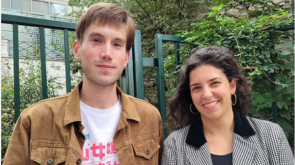
Sophie Bavard, lauréate du Prix de Thèse 2021 de la Société des Neurosciences
La Société des Neurosciences attribue chaque année des Prix de Thèse destinés à récompenser un travail de doctorat en neurosciences. La jeune chercheuse a été récompensée pour son travail sur la prise de décision. Sa thèse intitulée "Computational principles of adaptive coding in healthy and impaired reinforcement learning", soutenue il y a un an, a été effectuée sous la direction de Stefano Palminteri au Laboratoire de Neurosciences Cognitives et Computationnelles (LNC2).
Des travaux de recherche sur l’importance du contexte dans la prise de décision
La jeune chercheuse a travaillé dans l’équipe Human Reinforcement Learning dirigée par Stefano Palminteri au LNC2. Elle effectue son post-doctorat avec Sébastien Gluth au General Psychology Lab à l'Université de Hamburg en Allemagne où elle travaille sur un aspect social de la prise de décision.
Ses travaux de recherche actuels en neurosciences cognitives portent sur les applications computationnelles dans la prise de décision basée sur la valeur. La jeune chercheuse s'intéresse aux différentes stratégies que nous utilisons pour prendre des décisions, à leur variabilité inter-individuelle, et aux neuropathologies émergeant de leur dysfonctionnement.
Résumé de sa thèse "Computational principles of adaptive coding in healthy and impaired reinforcement learning"
Do you think you make all your decisions rationally? Imagine that you can choose between different fruits: you probably have a pre-established order of preferences and you will make your choice accordingly. If you prefer apples to bananas, and bananas to cherries, chances are you prefer apples to cherries. But is this true for economic choices? Can your experience influence your decisions when it comes to money? These are the questions I addressed during my PhD, between cognitive neuroscience, mathematics and psychiatry. Using mathematical models, we showed that our choices are influenced by the context in which the values of the different alternatives were learned. First, we developed existing models and paradigms explaining decision-making strategies in a large sample of healthy volunteer participants, using recent tools such as large-scale online experiments. Then, we used innovative approaches to identify the links between the parameters of our decision-making models and reward-related pathological traits that may affect value learning. In the long term, this research will potentially help to develop new tools to characterize phenotypes of several pathologies and behavioral disorders, as well as improve patients’ treatment at the individual level.

A LIRE
- Sophie Bavard, une jeune chercheuse fière de contribuer à la valorisation des femmes dans la science
- Sophie Bavard récompensée par le prix Jeunes Talents France 2021 L'Oréal-UNESCO Pour les Femmes et la Science
- Thèse "Computational principles of adaptive coding in healthy and impaired reinforcement learning"
- Site internet de Sophie Bavard
A VOIR



